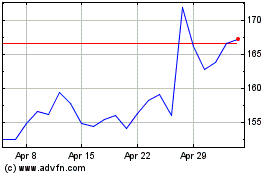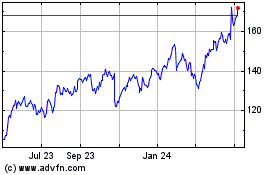By Emily Glazer and Kirsten Grind
Google and Twitter Inc. said they are taking additional steps to
tamp down misinformation about the U.S. election, as tech platforms
scramble to address an expected flood of false claims and
misleading posts ahead of the November vote.
In separate announcements on Thursday, Twitter said it plans to
more aggressively label or remove election-related tweets that
include disputed or misleading information, while Google said it
would screen more auto-complete suggestions to avoid voters being
misled.
Starting next week, Twitter said it would label or remove more
false or misleading content that could undermine public confidence
in an election as part of its civic-integrity policy. The
social-media platform will target even more specific types of
content while also expanding the reach of the policy to encapsulate
an election changed by the coronavirus pandemic with an
unprecedented number of Americans expected to vote by mail, a
spokesman said.
The changes could affect tweets claiming victory before election
results have been certified; posting unverified information about
ballot tampering or other matters that could undermine confidence;
or including false or misleading information that causes confusion
about laws, regulations, officials or institutions related to
elections.
Twitter's existing policy already targets content that makes
false claims on how to participate in civic processes, could
suppress participation or claims false affiliation with a candidate
or elected official.
Twitter has clashed in recent months with President Trump, who
has posted frequently about potential fraud in the coming election
and criticized the company for flagging his posts on that and other
matters that violate its rules. He has argued that the company is
biased against him.
Twitter said the tweets labeled under its expanded policy will
have reduced visibility across the platform, similar to its
existing enforcement. But people following accounts whose tweets
are labeled or removed can still view and retweet the content, the
company said.
"We will not permit our service to be abused around civic
processes, most importantly elections," Twitter wrote in a post
announcing the changes. "Any attempt to do so -- both foreign and
domestic -- will be met with strict enforcement of our rules, which
are applied equally and judiciously for everyone."
In its changes to auto-complete results, which predict what
users are searching for, Alphabet Inc.s Google will remove
predictions "that could be interpreted as claims for or against any
candidate or political party, " the company said in a blog post. It
also said it would screen out statements about voting methods and
requirements, so predictions such as "you can vote by phone" or
"you can't vote by phone" won't be produced in auto-complete. Users
will still be able to search for those topics on their own.
In a press call, David Graff, Google's senior director for
global policy and standards, said the search engine also would
remove any incorrect election information from some results that
aren't caught by the search engine's automated systems.
The company stopped short of saying it would remove all
incorrect information that's displayed in search -- Google has a
longstanding policy of not tampering with "organic" search results
that are derived from its algorithms.
A 2016 internal investigation at Google showed between a 0.1%
and 0.25% of search queries were returning misinformation of some
kind, The Wall Street Journal reported last year.
Given the huge volume of Google searches, that amounted to
nearly 2 billion searches a year. By comparison, Facebook Inc.
faced congressional scrutiny for Russian misinformation that was
viewed by 126 million users ahead of the 2016 election.
Twitter's latest move follows changes the tech firm has made
over the past several months related to political content. Last
year, Twitter became the first major tech platform to ban most
political ads. It has more recently labeled tweets, including those
from Mr. Trump, that violate its policies. Twitter's changes follow
Facebook's announcement last week that it would prohibit new
political ads in the week before the Nov. 3 presidential election
and seek to flag any candidates' premature claims of victory.
Technology platforms continue to face pressure about moderating
misleading or false content, both paid ads and organic posts,
related to the 2020 election. The Wall Street Journal reported in
August that Facebook, Twitter and Google have discussed with
federal officials how the social-media platforms can prevent the
spread of misinformation in the days before and after the election
since the U.S. intelligence community has warned of foreign
interference. The discussions have grown more urgent, the Journal
reported, as President Trump has repeated his warning of likely
vote-by-mail fraud, though studies haven't found widespread fraud
linked to mailed ballots.
Several studies, including by researchers at Dartmouth College
and New York University's School of Law, have found no evidence of
widespread fraud in past elections, though there have been isolated
cases.
Twitter last week placed a public-interest notice on two tweets
from Mr. Trump's account, which has nearly 86 million followers,
that encouraged people to potentially vote twice because it
violated the firm's civic-integrity policy.
A Twitter spokesman also said the tech firm has conducted
exercises internally as it prepares for different potential
election scenarios. Between March 1 and Aug. 1, Twitter's
cross-functional election team worked on topics including platform
manipulation activity, foreign interference, coordinated online
voter suppression campaigns and leaks of hacked materials.
--Alexa Corse contributed to this article.
Write to Emily Glazer at emily.glazer@wsj.com and Kirsten Grind
at kirsten.grind@wsj.com
(END) Dow Jones Newswires
September 10, 2020 16:26 ET (20:26 GMT)
Copyright (c) 2020 Dow Jones & Company, Inc.
Alphabet (NASDAQ:GOOGL)
Historical Stock Chart
From Mar 2024 to Apr 2024

Alphabet (NASDAQ:GOOGL)
Historical Stock Chart
From Apr 2023 to Apr 2024
